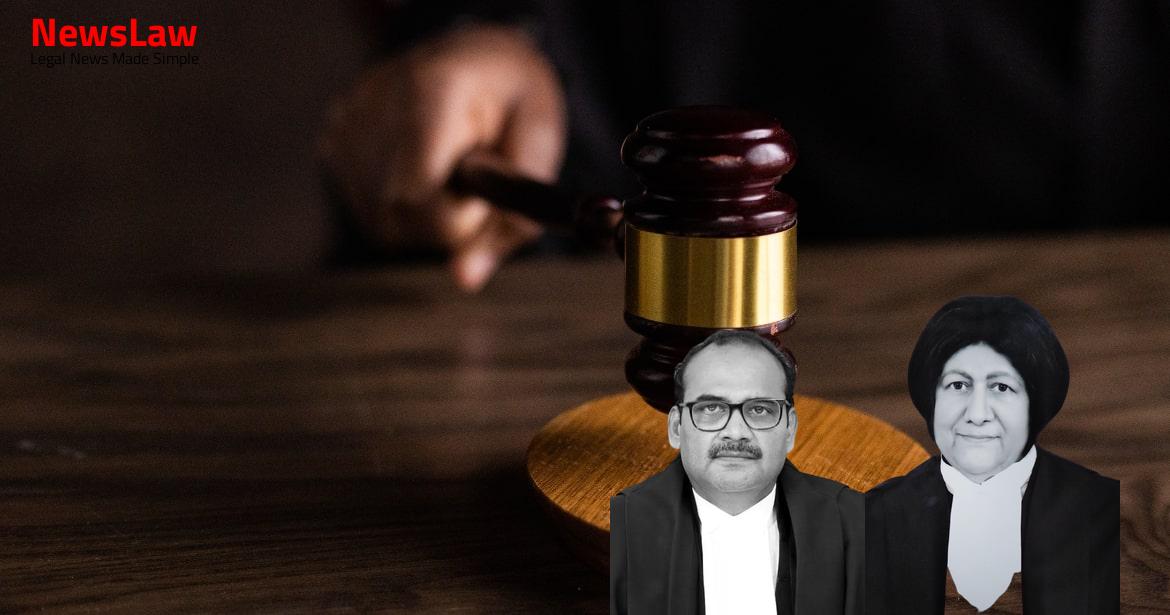The case of the accused appellant, involving Ms. D as the victim, centers around the violation of the Juvenile Justice Act. The accused, a Child in Conflict with Law, was convicted and sentenced without following the mandatory guidelines of the JJ Act. The judgment highlights concerns about the integrity of the trial proceedings and the need for proper adherence to legal provisions. Stay informed about this significant legal issue involving Ms. D and the accused appellant.
Facts
- Ms. D, a 6-year-old child, went missing on July 2, 2016.
- The accused was apprehended while trying to run away and was interrogated.
- The accused confessed to his guilt, and his admission was recorded.
- Various witnesses were examined, and documents were exhibited during the prosecution.
- The accused’s mother filed a petition seeking a reduction in his sentence based on his good behavior.
- The accused filed an appeal against his conviction and sentences, which was rejected by the High Court.
- The accused appellant’s counsel argued that the procedural requirements under the Juvenile Justice Act were not followed in the trial.
- The accused, being a Child in Conflict with Law, should have been tried following the JJ Act procedures.
- Charges were framed against the accused, and he pleaded not guilty.
- Incriminating articles were recovered from the accused’s house.
- The Investigating Officer gathered information indicating the accused was a juvenile.
- The accused was sentenced to imprisonment for various offenses under different sections of the IPC and POCSO Act.
- The trial Court convicted and sentenced the appellant on February 18, 2019.
- The appellant filed a criminal appeal under Section 374(2) of the CrPC.
- The High Court of Judicature at Madras, through a Single Judge, dismissed the appeal on April 15, 2021.
- The conviction and sentences awarded to the appellant were affirmed by the High Court.
- The trial Court held in paragraph 96 of its judgment that the accused was 19 years and 2 months old at the time.
Also Read: Admission Dispute: State of Maharashtra vs. Appellant in MBBS Course
Issue
- First, the judgement will address whether the trial is affected by failure to follow the mandatory guidelines of the JJ Act.
- The focus will be on determining if non-adherence to the requirements of the JJ Act has vitiated the trial.
- This section aims to analyze the impact of any deviations from the legal provisions specified in the JJ Act.
- The main concern is whether any non-compliance with the JJ Act has affected the validity of the trial proceedings.
- Key aspects to consider include whether the trial can be considered legally sound despite any potential non-adherence to the JJ Act.
- Any discrepancies related to the mandatory requirements of the JJ Act will be thoroughly examined for their implications on the trial’s integrity.
Also Read: Kozyflex Mattresses Pvt. Ltd. vs. SBI General Insurance Co. Case Summary
Arguments
- The defense counsel argued against the admissibility of the confession of the accused appellant, citing improper procedure during investigation.
- The defense counsel criticized the trial court for allowing the confession to be exhibited and relying on it for the conviction of the accused appellant.
- It was emphasized that even after the transfer of the case under Section 15, the Children’s Court should independently assess the need for the trial of the CICL as an adult.
- The defense counsel raised doubts about the reliability of witnesses (PW-10) and (PW-11) whose depositions formed the basis of the ‘last seen’ circumstance.
- The defense contended that the recovery of the dead body based on the disclosure statement of the accused appellant lacks reliable evidence, leading to a lack of convincing circumstantial evidence.
- Learned counsel for the State relied on judgments in the cases of Karan alias Fatiya v. State of Madhya Pradesh and Pawan Kumar v. State of Uttar Pradesh & Ors.
- The impugned judgment was argued not to warrant interference by this Court.
- After considering the submissions and going through the judgments on record, it was noted that the investigation and trial should not be considered vitiated solely on procedural irregularities.
- State’s counsel vehemently opposed the appellant’s submissions.
- The trial was conducted by a Sessions Court designated as a Children’s Court.
Also Read: Rajeev Savara v. State of Maharashtra & Ors.
Analysis
- The accused appellant was a Child in Conflict with Law (CICL) on the date of the incident, known since the inception of proceedings.
- The Children’s Court must determine the need for trial of a CICL as an adult.
- Trial Court proceeded without a preliminary assessment by the Board as mandated by the JJ Act.
- The proceedings, conviction, and sentencing of the CICL by the Sessions Court violated the JJ Act’s mandates.
- The trial was found to be grossly illegal, attempting post facto validation of the proceedings was deemed insufficient.
- The entire proceedings were vitiated by not following the JJ Act’s procedures.
- The Courts noted the accused’s juvenility at the time of the crime, but failed to adhere to mandatory JJ Act provisions.
- The accused appellant’s mental and physical capacity at the time of the offense could not be assessed.
- Given the violations of the JJ Act, the proceedings were considered void, not requiring a reevaluation of the case’s merits.
- The accused should have been sent to the Juvenile Justice Board for further directions.
- Preliminary assessment into heinous offences by the Board for children aged sixteen and above.
- The Board conducts a preliminary assessment to determine mental and physical capacity of the child to understand and commit the alleged offence.
- Assistance of psychologists or experts can be sought for the assessment.
- The assessment is not a trial but to evaluate the child’s capacity and understanding of the alleged offence.
- Procedure to be followed by the Board if the matter is to be disposed by them.
- Options available to the Board based on the nature of the offence and past conduct of the child.
- Orders range from advice or admonition to community service, probation, special home placement, or transfer to a place of safety.
- Principles guiding the Juvenile Justice System including presumption of innocence, right to privacy, institutionalization as a last resort, and principles of diversion and natural justice.
- Magistrates not empowered under the Act must forward cases involving children to the Board for appropriate action.
- Children’s Court powers after receipt of preliminary assessment from the Board.
- Children’s Court can decide trial as an adult or conduct an inquiry based on assessment received.
- Principles of participation, best interest, family responsibility, safety, and non-waiver of rights to guide decision-making regarding children.
- The interpretation of Section 9(3) by the court in the case of Karan Alias Fatiya was discussed.
- Section 9(3) does not invalidate a conviction if the person is later found to be a juvenile or a child.
- The judgement in Karan Alias Fatiya is distinguishable from the current case.
- In the present case, it was known to all parties that the accused was a child at the time of the incident.
- Illegal proceedings cannot be saved by giving ex post facto approval when the accused’s juvenile status was already known.
- The impugned judgment is quashed and set aside.
- The appellant, currently in jail, is to be released immediately if not required in any other case.
- The prosecution must prove the guilt of the appellant through reliable circumstantial evidence.
Decision
- Pending applications will be resolved
- The appeal has been allowed
Case Title: THIRUMOORTHY Vs. STATE REPRESENTED BY THE INSPECTOR OF POLICE
Case Number: Crl.A. No.-001773-001773 / 2024



